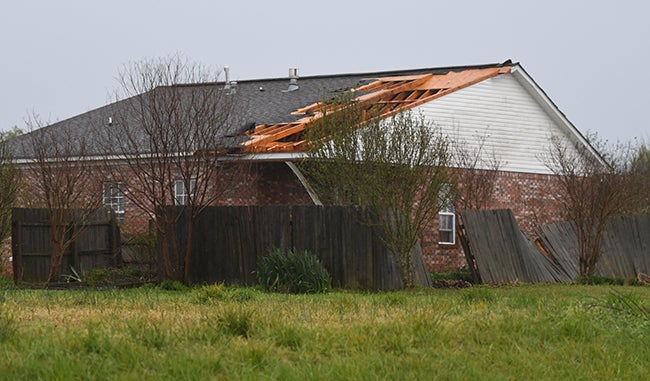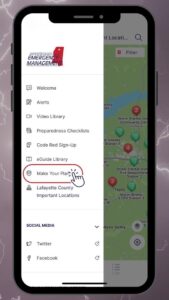Prepare for severe weather before it happens
Published 3:05 pm Monday, February 12, 2024

- A house on Woodson Ridge Road was damaged during a storm that passed through the area, near Oxford, Miss. on Saturday, April 14, 2018. The National Weather Service said an EF1 tornado was on the ground for about a minute in the Woodson Ridge area before dissipating. Photo by Bruce Newman
When winter starts to make way for spring, the battle of cold and warm fronts can cause severe storms to pop up, bringing hail, high winds and sometimes tornadoes.
Being prepared for severe weather is something all Lafayette County residents should be all year long.
This week is Spring Severe Weather Preparedness Week in Mississippi. The purpose of the week, declared by Gov. Tate Reeves, is to remind the public about the potential dangers severe weather can cause, as well as provide information on ways to people can protect themselves.
“As we see this time of year our temperatures can fluctuate, going from really cold to having warm spells which can provide a recipe for severe weather,” said Lafayette County Public Information Officer Beau Moore. “We just want to bring awareness to the community that this is a good time for families to learn about the types of severe weather that can affect our area and ways to protect themselves.”
Throughout the week, Lafayette County Emergency Management, MEMA and the National Weather Service will focus on different storm-related topics daily. Sunday started with “Making a plan.” Monday’s focus is “thunderstorms;” Tuesday’s is “flash flooding;” Wednesday’s is “Tornados:” Thursday’s is “Lightning;” Friday’s is “Alerts and Warning Reception;” and Saturday’s is “Mobile Home Safety.”
 Making a plan for severe weather is easier now with the Lafayette County Emergency Management app.
Making a plan for severe weather is easier now with the Lafayette County Emergency Management app.
“The app will guide you step by step on how to make a plan and the app will save it for you,” Moore said. “So, if there is a severe weather event you can go straight to your plan.”
The app includes the locations of storm shelters, community service information, tornado preparedness and more.
Moore said people should not rely on tornado sirens as their only alerts for tornadoes.
“They’re actual name is ‘outdoor warning sirens,’ because they are designed to warn you when you’re outdoors,” he said. “They are not meant to be heard inside your house.”
Their origins came when folks spent most of their days outdoors tending their farms.
“We didn’t have cell phones back then and they needed to know to seek shelter,” he said. “So, we really encourage people to be dependent on those sirens and to have a way to get notifications on their cell and if they don’t have a cell phone, to have a NOAA weather radio.”
Moore suggests people have multiple ways to get alerts whether it’s on social media following Lafayette County EMA on Twitter or watching local news stations or signing up for alert systems like CodeRed.
The last day of the week will focus on mobile home safety.
“Our storm shelters are for all residents or anyone who is in the county at the time of a tornado, but it is imperative that folks who live in mobile homes are going to the storm shelters,” he said. “And it’s not just when a tornado warning happens — we suggest when a tornado watch is issued for the area that folks in mobile homes head to a storm shelter.”
Lafayette County Emergency Management will be posting information each day this week on the various topics on their Facebook and Twitter pages.





